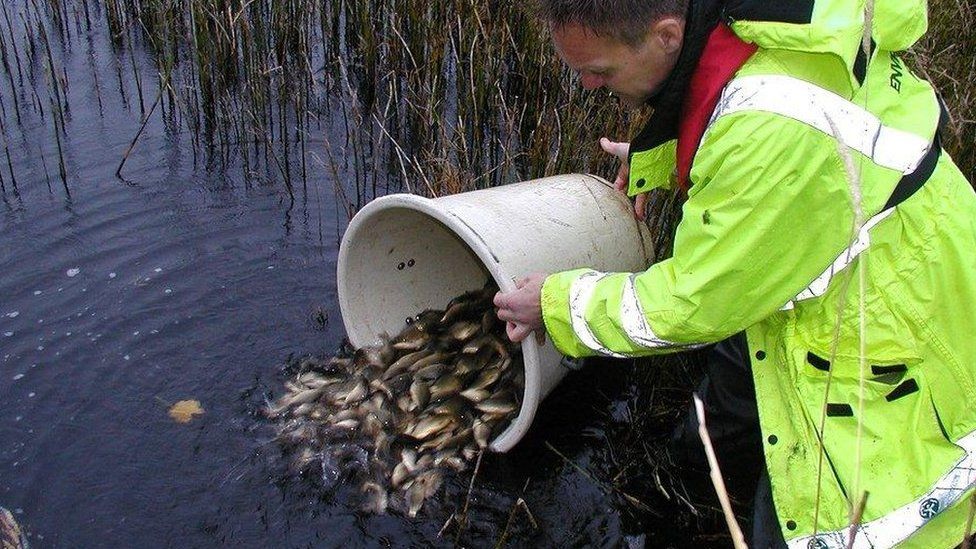Record year for fish releases in England's rivers
- Published

A record number of captive-bred fish were released in 2015 to boost populations in England's rivers, says the Environment Agency.
Almost two million coarse fish were released, helping to restock populations where water quality was improving after years of pollution.
The species that were captive-bred by the Environment Agency included chub, bream, tench and roach.
The fish and larvae were bred at the agency's Calverton farm in Nottingham.
Fish farm team leader Alan Henshaw said there were two main reasons why 2015 was a record-breaking year.
"One was the weather; it was a very good year for growing fish," he explained.
"Fish do not like surprises so if we have a summer where the temperature is consistent, that is far better.
"It is not good when the temperature gets over 24C or 25C (75-77F) because they get a little more difficult to grow because the water is warmer. Basically, a good year for growing fish is when it is not a good year for a sun tan."
The second reason was a result of the discovery that fish rearing was more successful when there was a larger mix of species within the farms tanks and ponds, he told BBC News.
"Before, we'd only grow three species in a pond - that would have been a bottom feeder, mid-water feeder and a surface feeder.
"But we have realised that if we keep the biomass - the total amount of fish - the same but make that biomass up out of five or six species, the fish do much better. It's called polyculture. We didn't invent it, they have been doing it in Europe since the Middle Ages. We've tweaked it and it is working really well."
In order to maintain the fitness and genetic integrity of the wild populations, the team at the fish farm do not keep brooding adults. Instead they collect adult fish from rivers each year in order to harvest eggs and sperm that will be used to grow the fish.
Mr Henshaw said: "The fish we produce here are never more than one generation from wild.
"It is not like a trout farm that is producing fish for the table. The whole idea behind our fish is that they are fit for purpose - they are not naive and they are prepared for life in the wild."
The fertilised eggs are incubated for 3-30 days, before the larvae is transferred to ponds under polytunnels to protect the tiny animals from predators and cold temperatures for the first year.
They are moved to outdoor ponds for the second summer of life, and are fed natural food and experience flowing water.
"We drop the food in the flow and if the fish want to eat then they have got to swim - and we feed them on natural food so they know what natural food is," Mr Henshaw explained.
"Our fish are effectively wild fish that have just so happened to have spent the first two years of their life growing on a fish farm. We have grown them in as natural rearing conditions as we possibly can."
- Published15 June 2014
- Published2 August 2014
- Published27 November 2009
- Published22 October 2010